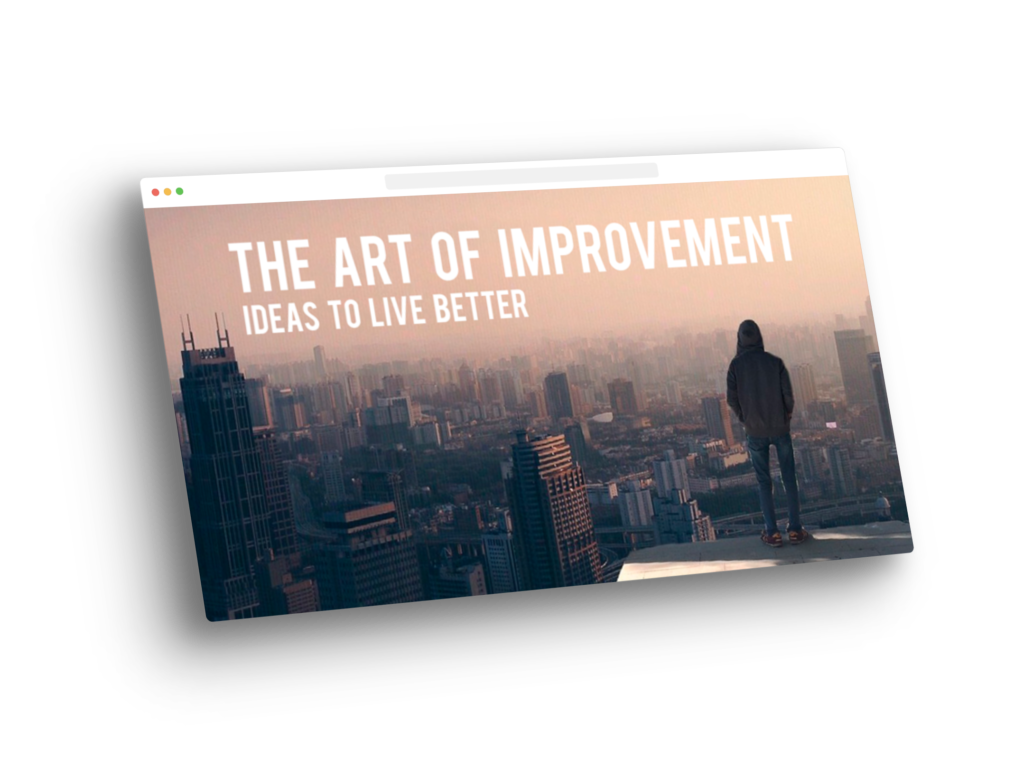We’re always performing, whether that’s professionally, socially, or personally. Such performances rely on self-confidence in so many ways.
When you are at work, excelling feels within your grasp when confidence is oozing from you. Socially, showing up when you’re self-confident is easier, which is also a vital tool in combating social anxiety. Personally, looking in the mirror is a wholly more relaxing experience with self-confidence. Without it, things can be difficult. Self-confidence gives you the skip in your step that prompts you to try new experiences, meet new people and simply enjoy a happier existence.
So, naturally, pushing yourself to live the best version of your life is difficult when that inner drive is waning.
There’s nothing like self-confidence, it’s the elixir of youth and the driving force behind humankind. It’s why learning how to boost it is pivotal for overall life satisfaction and improvement.
Understand Your Fears
There’s a reason most people know roughly how long it took to build Rome. It wasn’t built in a day, that’s for sure. Regardless, there’s a reason that turn of phrase is so well known. Like an empire, your self-confidence is built; brick by brick, action by action, day by day. Time spent waiting for confidence to arrive is time wasted. However, it’s wrong to assume that mere knowledge of that will do anything in boosting self-confidence. One of the most significant challenges facing anyone struggling with their confidence is dealing with any fears.
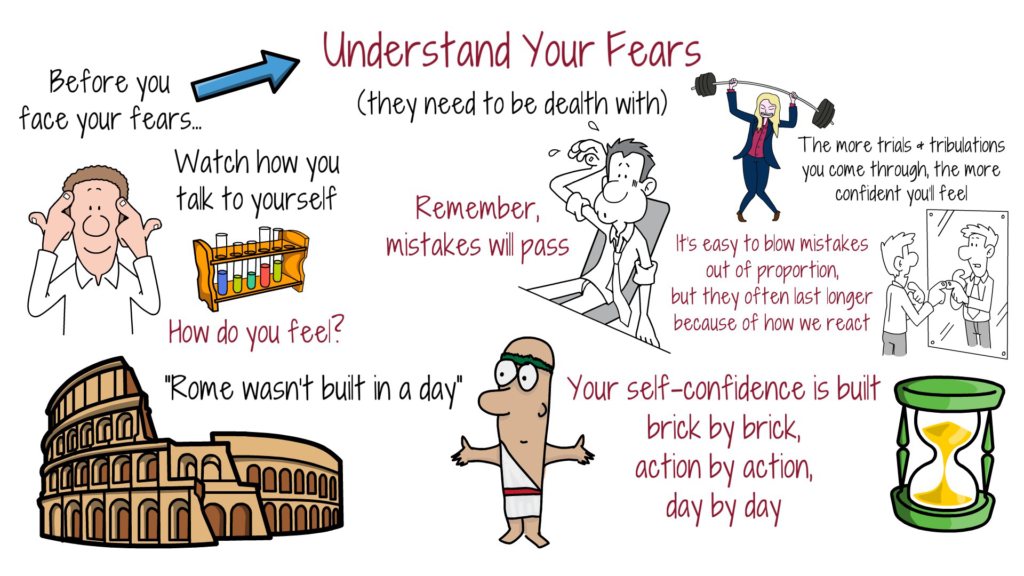
One of the most effective fear-conquering methods is to face them head-on, but first fears must be understood. Start with watching how you talk to yourself. Treat it as an experiment by practising the fears that originate from a lack of self-confidence. Note how you talk to yourself when faced with something that scares you, and perhaps most importantly, how you feel.
When you’re able to see how you are when forced to confront fears, you can go about putting effort toward mending them. A simple but effective thing to remember is that mistakes will pass. Self-confidence is quick to fade when a person views a pillar of their life as insufficient, so it’s easy to latch on to mistakes and blow them out of proportion. However, while mistakes can feel damaging in the moment, they often last longer because of how we react.
Making mistakes will only serve to boost your confidence. The more trials and tribulations you come through, the more confident you’ll feel. That sense of resilience is a fundamental part of establishing confidence in the long run, as it provides an extra layer of security – a knowledge that you have the power to bounce back from whatever life throws your way.
After all, mistakes fade, events pass, and time moves forward.
Improve Your Competencies
What’s one of the first questions you hear when you meet someone new?
“What do you do?”
The expected, the dreaded question. Its answer feels like a routine. It can also be a source of self-confidence issues for many. Of course, if you’ve got plenty of achievements to brag about, such a question might perk your ears, but a lack of success can feel uncomfortable to share, particularly in a social setting.
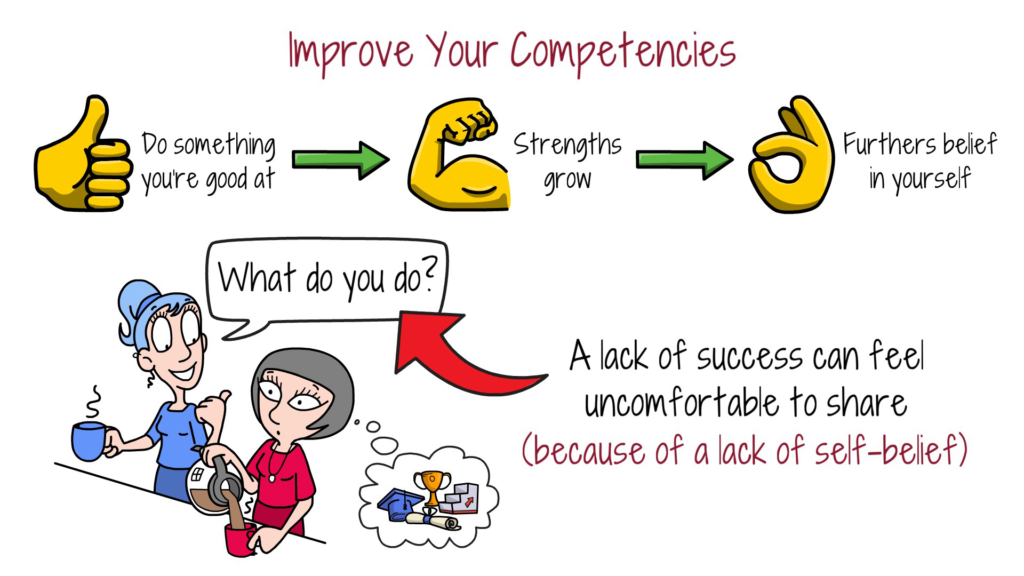
This is all because of self-belief, or a lack thereof. But self-confidence doesn’t only rest in the list of worthy achievements in your arsenal. It’s likely to make itself known when you do something you’re good at – strengths grow, thus furthering belief in yourself. From there, you’ve bought a ticket headed straight toward life satisfaction.
Here, the key lies in repetition. The more you do something, such as playing football or public speaking, for example, the better you’ll become. That feeling of accomplishment is almost impossible to ignore and can become a pillar of self-confidence. It’s that knowledge you have that talent in your locker that works here.
As you can probably guess, the first step is identifying your strengths. From there, you can act. Remember, it’s all about building self-belief – knowing that you have a lot to offer even if you don’t think so.
Set Realistic Goals
One element of life that can drag self-confidence down more than you’d expect is goal setting. It’s easy to set goals – earn $1,000,000 or run a marathon, for example, but therein lies the problem. Goals are often too broad for our shoulders. It’s not that they aren’t attainable, it’s that the actionable steps aren’t clear.
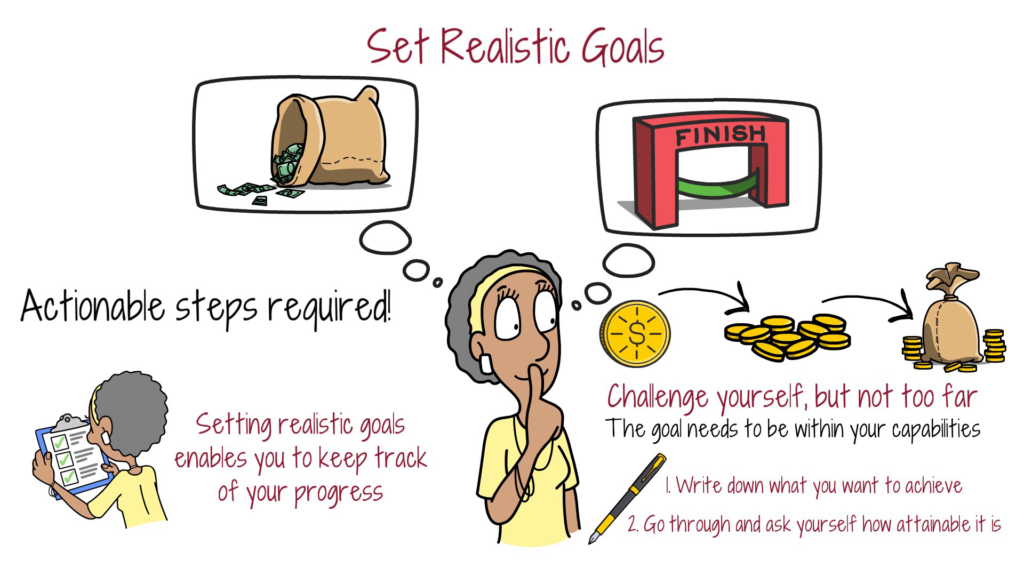
The answer is simple. Setting realistic goals enables you to keep track of your progress and not get swamped by the grandiosity of a goal. Instead of looking up at a million-dollar mountain, make your current ceiling visible. Earning your first $1000 or the next $10,000 might be more attainable and clear. The point is to challenge yourself, but not too far. Whatever the goal is, it needs to be within your capabilities. That way, you can keep it within sight.
A simple way to carry this out is by writing down what you want to achieve. Then, go through and ask yourself honestly how attainable it is. It’s okay if your targets aren’t as achievable as you thought. Reign them in and go from there.
Develop a Growth Mindset
Boosting your confidence is, first and foremost, about growth. As your self-esteem grows, your confidence does. It should come as no surprise that the growth mindset, a concept famously coined by psychologist Carol Dweck, makes it onto this list. Put simply, someone with a growth mindset believes they can develop their skills through hard work and practice. It’s nothing revolutionary, but without it, people can remain stuck in their circumstances.
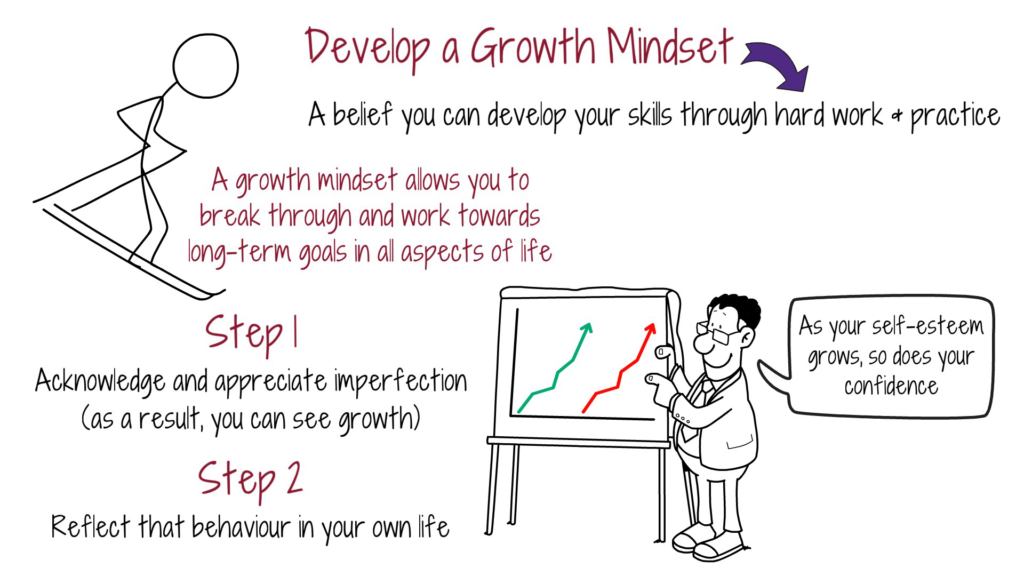
A growth mindset gives you skis to glide over the thick snow, allowing you to break through the thick of it and work towards long-term goals in all aspects of life.
Here, the first step is to acknowledge and appreciate imperfection, whether that’s in yourself, your friends, your family, or anyone else. As a result, you can see growth in others too. Then it’s all about reflecting that behaviour in your own life. The things we don’t like about ourselves aren’t necessarily set in stone. They ebb, flow, and of course, grow.
Become Familiar With ‘No’
Perhaps one of the most immediate ways you can gain a wash of self-confidence is through a simple word.
“No”
It’s absolute in its certainty and definitive in its brevity. Yet, it’s something so many shy away from. After all, while repeating things you’re good at does act as a self-confidence booster, recognising situations and environments that pose a risk to your confidence can be just as, if not more important at growing and maintaining confidence levels. For example, you may find that even though you like being with your friends, playing football is not your thing. It’s easy for self-esteem levels to fall from there.
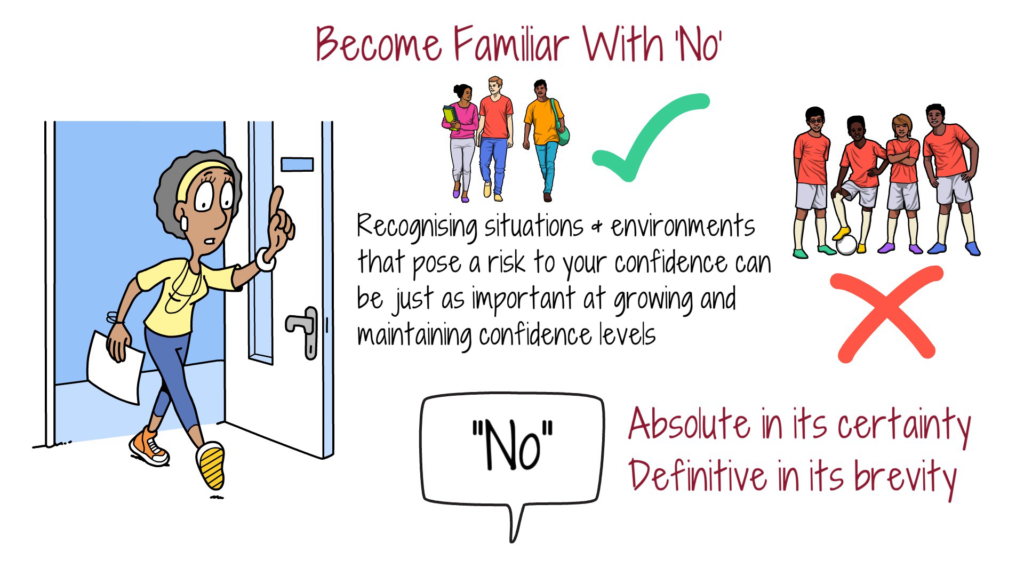
It can feel difficult to say no to things and people, but at the end of the day, it’s you that feels uncomfortable as a result. Of course, leaving your comfort zone is important for overall growth, but it’s also okay to know your boundaries and protect yourself from pain.
A lot of self-confidence derives from feeling in control. Becoming accustomed to the word “no” enables you to set up psychological boundaries, putting you in the driver’s seat. This way, your social and emotional wellbeing can flow more smoothly. The more you control, the better.
Putting it into practice may feel daunting, but it doesn’t need to go that way. The next time you’re invited to a function that you know will damage your self-confidence, by however much, respectfully decline. Time will pass, and the sense of accomplishment you gather from choosing yourself over other people will only serve to push self-confidence to new heights.
Boosting Your Confidence Starts With You
For anyone suffering from a lack of self-confidence, it can prove difficult to live life to its fullest. Achieving goals can feel far away and unlikely. Daily life is often challenging too. That said, boosting how you feel about yourself isn’t a million miles away.
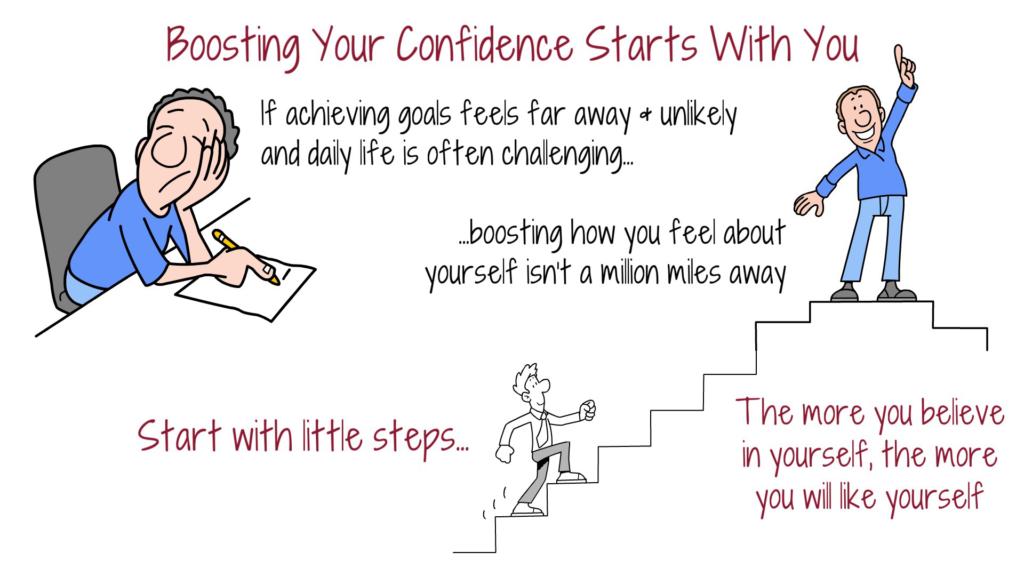
Becoming more confident is all about how much you believe in yourself. When you’re being introduced to someone, do you feel proud of what’s being said or do you struggle to listen? The more you believe in yourself, the more you will like yourself.
It all starts with little steps. It can start by saying “no” to an event you know you won’t like, or even simply setting a new, more attainable goal. Whatever it is, I hope it helps you believe in yourself more.
